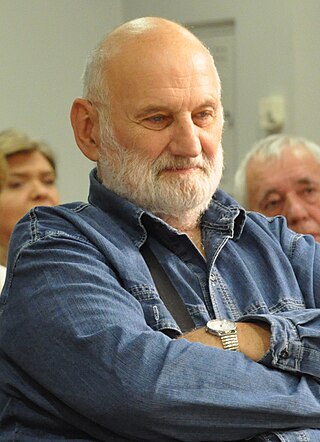
Abdulah Sidran, often referred to by his hypocoristic nickname Avdo, was a Bosnian poet and screenwriter. He is considered to be one of the most influential writers in both Bosnia and Herzegovina and the former Yugoslavia.

Rade Šerbedžija is a Croatian actor, director and musician. He is known for his portrayals of imposing figures on both sides of the law. He was one of the best known Yugoslav actors in the 1970s and 1980s. He is internationally known mainly for his role as Boris the Blade in Snatch (2000), his supporting roles in such Hollywood films as The Saint (1997), Eyes Wide Shut (1999), Mission: Impossible 2 (2000), X-Men: First Class (2011), Harry Potter and the Deathly Hallows: Part 1 (2010), and Taken 2 (2012); and for his recurring role as former Soviet Army General Dmitri Gredenko in Season 6 of TV action series 24.

Antun Vrdoljak is a Croatian film actor and director, sports official, and head of Croatian Radiotelevision during the Yugoslav Wars. Between the 1960s and early 1990s he was mainly a film artist. In the early 1990s he became involved in politics and became a prominent member of the Croatian Democratic Union (HDZ), which led to his appointment to a series of offices. He was director general of Croatian Radiotelevision (1991–1995), and president of the Croatian Olympic Committee (1991–2000).

Zoran Simjanović was a Serbian and Yugoslav musician, composer and music educator.

The Cinema of Serbia refers to the film industry and films made in Serbia or by Serbian filmmakers.

The Cinema of Yugoslavia refers to the film industry and cinematic output of the former Socialist Federal Republic of Yugoslavia, which existed from 1945 until it disintegrated into several independent nations in the early 1990s. Yugoslavia was a multi-ethnic, socialist state, and its cinema reflected the diversity of its population, as well as the political and cultural shifts that occurred during its existence.

Pula Film Festival is an annual Croatian film festival, established in 1954. It is held in a Roman amphitheater known as the Pula Arena. Pula Film Festival is the oldest Croatian film festival and is usually held in the summer, in July or August.

Goran Marković is a Serbian film and theatre director, screenwriter, writer, and playwright. He has directed approximately 50 documentaries, 13 feature films, and 3 theatre plays. He has also written five books.

Živojin "Žika" Pavlović was a Yugoslav and Serbian film director, writer, painter and professor. In his films and novels, Pavlović depicted the cruel reality of small, poor and abandoned people living in the corners of society. He was one of the major figures of the Black Wave in Yugoslav cinema in the 1960s, a movement which portrayed the darker side of life rather than the shiny facades of communist Yugoslavia.

Variola Vera is a 1982 Yugoslav film directed by Goran Marković. Due to its subject matter and tone, the film is often described as horror.
The Golden Arena awards were established in 1955 as the Yugoslav national film awards presented annually at the Pula Film Festival in Pula, Croatia, with the Big Golden Arena for Best Film its main prize. From 1955 to 1990 the awards were the Yugoslav cinema equivalent of the Academy Awards.
The Meeting Point is a 1989 Yugoslavian fantasy/comedy-drama film directed by Goran Marković and starring Rade Marković, Bogdan Diklić, Dragan Nikolić, Mirjana Karanović and Anica Dobra. It is based on Dušan Kovačević's play of the same title translated in the U.S. as The Gathering Place.
Train Without a Timetable is a 1959 Yugoslav film directed by Veljko Bulajić. It was entered into the 1959 Cannes Film Festival. The film was also selected as the Yugoslav entry for the Best Foreign Language Film at the 32nd Academy Awards, but was not accepted as a nominee.
Kozara is a 1962 Yugoslav film directed by Veljko Bulajić. It is a well known film of the partisan film subgenre popular in Yugoslavia in the 1960s and 1970s and depicts events surrounding the Battle of Kozara.
Vojislav "Voja" Mirić was a Serbian television and film actor most noted for his role as Ahmed Nurudin in the 1974 Yugoslav movie Dervis i smrt.
Frano Vodopivec was a Croatian cinematographer.
![<i>National Class Category Up to 785 ccm</i> 1979 [[Yugoslavia]] film](https://upload.wikimedia.org/wikipedia/en/7/77/Nacionalna_Klasa_Poster.jpg)
National Class Category Up to 785 ccm is a 1979 Yugoslav comedy film directed by Goran Marković.
The Prague film school, also known as the Czech film school or the Prague wave was a group of Yugoslav film directors who rose to prominence in the 1970s after graduating from the Film and TV School of the Academy of Performing Arts in Prague (FAMU). Five prominent Yugoslav directors born from 1944 to 1947 attended classes at FAMU: Lordan Zafranović, Srđan Karanović, Goran Marković, Goran Paskaljević (1947-2020), and Rajko Grlić. Emir Kusturica, who was born is 1954, is sometimes also considered a member of the Praška škola. Cinematographers Živko Zalar, Predrag Pega Popović, Vilko Filač, Valentin Perko, and Pavel Grzinčič, also studied at FAMU, as did editor Andrija Zafranović, who worked with Kusturica and his brother Lordan Zafranović.
Taiwan Canasta is a 1985 Yugoslav comedy-drama film directed by Goran Marković.

Karl Novak was a Yugoslav Slovene military officer best known as commander of the Slovene Chetniks in the Italian-annexed Province of Ljubljana during World War II.











![<i>National Class Category Up to 785 ccm</i> 1979 [[Yugoslavia]] film](https://upload.wikimedia.org/wikipedia/en/7/77/Nacionalna_Klasa_Poster.jpg)
